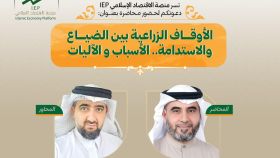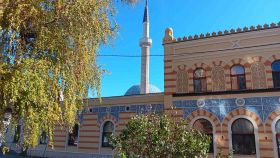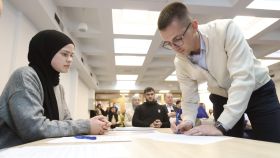On February 1, 2025, an international online conference titled "Agricultural Waqfs Between Loss and Sustainability: Causes and Protection Mechanisms" was held, organized by the Islamic Economy Platform (IEP). Based in Saudi Arabia, IEP is recognized as a leading organization in promoting Islamic economic principles, educating about waqfs, and fostering sustainable development through numerous conferences and educational programs. The conference brought together more than 80 participants from over 20 countries, including researchers, legal experts, and specialists in Islamic economics and waqfs.
During the conference, two distinguished speakers presented their insights:
- Dr. Ibrahim Abdul Latif Al-Oubaidi, an expert from Kuwait known for his work on preserving and revitalizing waqf assets. In his presentation, Dr. Al-Oubaidi analyzed the key causes of the loss of agricultural waqfs, including state expropriation, mismanagement, and weak legal frameworks in regions such as Egypt, Iraq, and Syria.
- Prof. Dr. Bishr Mohamed Mouafaq, a specialist from Saudi Arabia, focused on the practical aspects of economic sustainability in waqfs. He emphasized the importance of waqf administrators actively engaging in modern economic processes, particularly in the strategic management of agricultural waqfs. Dr. Mouafaq highlighted the need to develop models that reinvest waqf revenues into sustainable projects to ensure their continuity and long-term functionality.
Dr. Mouafaq provided concrete examples of how waqfs can be integrated into the modern economy through the establishment of agricultural cooperatives, the development of markets for waqf products, and partnerships with the private sector. He placed special emphasis on building the capacities of waqf management structures to ensure their sustainability and enhance their contribution to local communities. His presentation underscored that agricultural waqfs not only have the potential for food production but can also serve as key sources of employment, particularly in rural areas.
The conference focused on the causes of agricultural waqf losses, which include state expropriation, nationalization, mismanagement, lack of legal protection, economic and social factors, as well as the impact of wars and market pressures. These factors have significantly contributed to the weakening and disappearance of agricultural waqfs in many countries.
Among the conference participants was Dr. Senaid Zajimović, Director of the Waqf Directorate of the Islamic Community in Bosnia and Herzegovina, who made a significant contribution to the discussions by drawing parallels between the expropriation of waqf properties in Arab countries and similar processes in the Balkans. He particularly highlighted the consequences of agrarian reforms in the former Yugoslavia, which led to the confiscation or destruction of waqf properties. He also stressed the importance of preserving waqfs through modern legal mechanisms, active waqf engagement, and precise documentation.
Agricultural Waqfs and Sustainability
One of the key topics of the conference was the role of agricultural waqfs in sustainability. Agricultural waqfs are not only an economic resource but also a crucial tool for ensuring food security and sustainable development. Proper management of these waqfs provides long-term sources of healthy food, directly contributing to the fight against hunger, poverty reduction, and the preservation of natural resources.
A notable example comes from Bosnia and Herzegovina, where the Islamic Community manages a significant percentage of waqf land suitable for agricultural production. These parcels have immense potential for cultivating various scarce crops, making them essential resources for strengthening local economies and ensuring food security in the region. The Islamic Community of Bosnia and Herzegovina has already demonstrated significant initiative in revitalizing waqf assets, setting an example of successful management that could serve as a model for other countries.
The conference resulted in key recommendations for collaboration between economists, legal experts, government representatives, and waqf administrators to develop sustainable strategies for preserving and enhancing waqf assets. The participation of Dr. Senaid Zajimović provided a unique perspective, further enriching the discussions, particularly regarding the adaptation of agricultural waqfs to modern needs and challenges.



